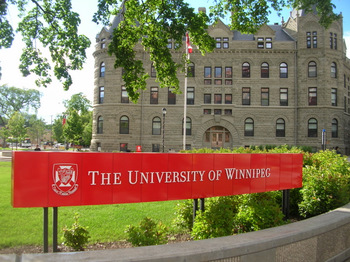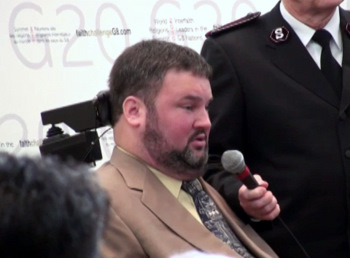A few weeks ago, my mixed feelings about multi-faith advocacy were brought to the surface.
Before I confess my misgivings, I must tell you that I’m especially indebted to people of other religions and denominations. When I was an agnostic high school student, a Bahá'í friend stoked my interest in God by inviting me to his religion’s “Fireside” gatherings. I was confirmed as a Catholic at 19, but then struggled to live out my faith in university. It was then that I stumbled upon a Pentecostal student convention, which introduced me to rich fellowship with evangelicals. They taught me passion and commitment.
Yet despite those positive experiences, and many more during my time in the Holy Land, I remained privately skeptical about the efficacy of interreligious coalitions.

On June 21st I arrived at the University of Winnipeg to cover the
World Religions Summit. The event's goal was to influence the upcoming G8 and G20 meetings. (Michèle Nuzzo-Naglieri
detailed the aims of the summit on Headline Bistro.) I wondered, though, whether a multi-faith assembly could garner much more influence or publicity than, say, the pronouncement of a singular Catholic Archbishop, who already represents a sizable constituency. Moreover, how much common ground could possibly be shared by this collection of miters, turbans and vibrant robes, representing a broad spectrum of traditional to reformed ideologies? Could eighty leaders representing nine world religions manage to draft a strong statement?
If there was tension among the delegates, this was kept well hidden. Their spirit of fraternity would have provided an edifying witness for combative clerics elsewhere, or for atheists who maintain that religion only breeds conflict.
The closing debate on the final statement centered on minor points of expression, rather than content. As it was put to a vote, the moderator, Rev. Dr. James Christie from the Canadian Council of Churches, convinced delegates to accept a declaration that he described as good, if imperfect.

The four-page statement, “
A Time for Inspired Leadership and Action”, asked the G8/G20 leaders to eradicate poverty, protect the environment and build peace. Politicians were reminded that nations have only five years left to meet their commitments in these areas, as outlined in the
Millennium Development Goals.
The declaration sought a middle ground between general calls for improvement (to which it’s difficult to hold politicians accountable) and specific policy demands (arguably outside the competence of religious leaders). It did, however, make some specific recommendations in the three key areas:
-Invest 0.7 % of Gross National Income in development assistance in a transparent and accountable manner.
-Cancel debts of poor countries without regressive conditions.
-Concrete plans must be implemented to ensure global average temperatures do not exceed a 2° Centigrade increase from pre-industrial levels.
-Make immediate and substantial cuts in the number of nuclear weapons and […] cease the practice of having nuclear weapons on hair-trigger alert. Let these be the initial steps in a defined process leading to the complete and permanent elimination of nuclear weapons.
At the end of the World Religions Summit, local MP and federal cabinet minister Steven Fletcher received the declaration and promised to forward it to the Prime Minister.
Did the G8 and G20 politicians listen? And did I leave Winnipeg convinced that the World Religions Summit was worthwhile? Find out tomorrow in Part 2.
S+L will air a special Catholic Focus on the World Religions Summit this fall, hosted by Jenna Murphy. More details will be posted on the S+L Blog in the coming weeks.
 The four-page statement, “A Time for Inspired Leadership and Action”, asked the G8/G20 leaders to eradicate poverty, protect the environment and build peace. Politicians were reminded that nations have only five years left to meet their commitments in these areas, as outlined in the Millennium Development Goals.
The declaration sought a middle ground between general calls for improvement (to which it’s difficult to hold politicians accountable) and specific policy demands (arguably outside the competence of religious leaders). It did, however, make some specific recommendations in the three key areas:
The four-page statement, “A Time for Inspired Leadership and Action”, asked the G8/G20 leaders to eradicate poverty, protect the environment and build peace. Politicians were reminded that nations have only five years left to meet their commitments in these areas, as outlined in the Millennium Development Goals.
The declaration sought a middle ground between general calls for improvement (to which it’s difficult to hold politicians accountable) and specific policy demands (arguably outside the competence of religious leaders). It did, however, make some specific recommendations in the three key areas: